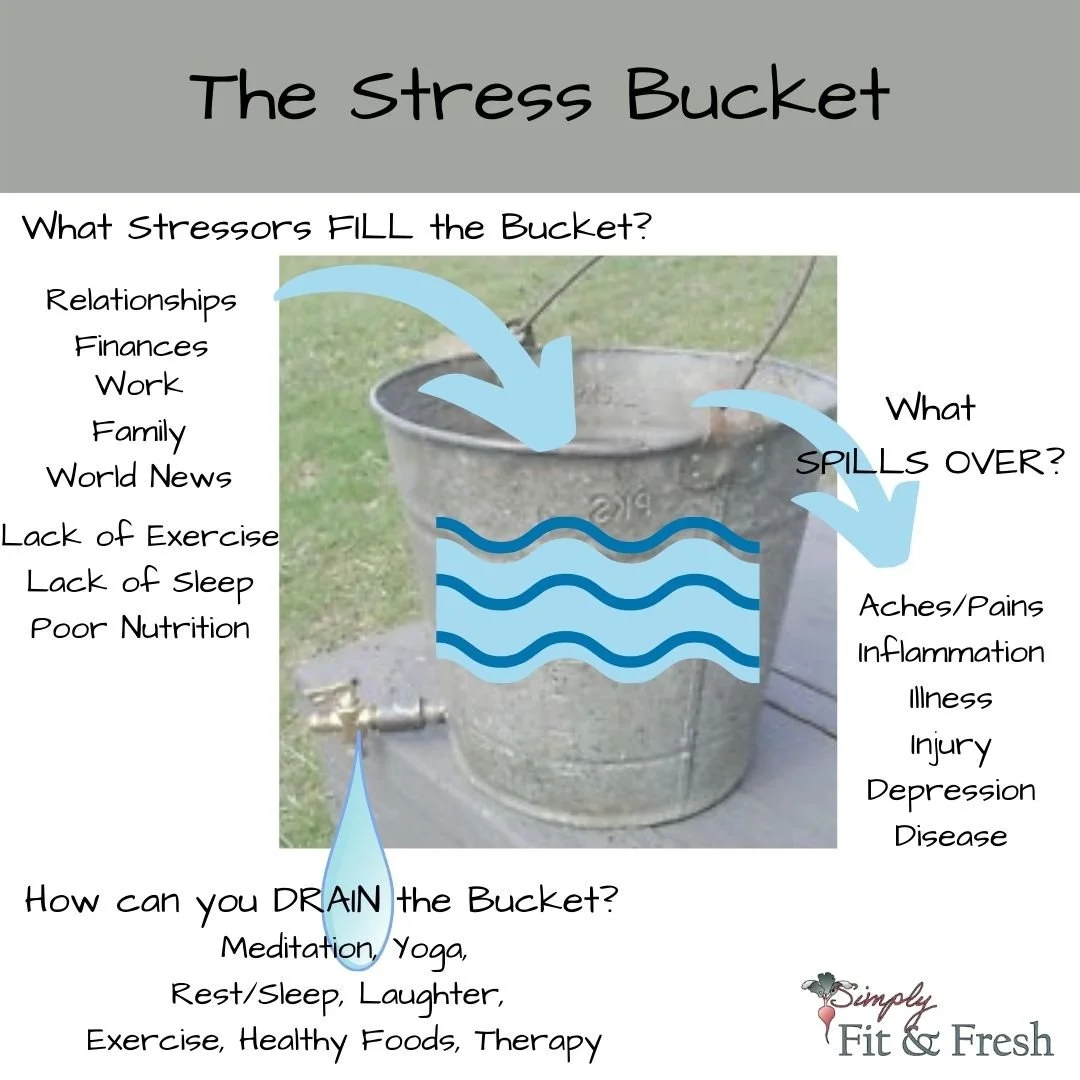Stress: Awareness, Reduction, Resilience
Stress: A physical, mental or emotional tension or strain.
Acute stress is a reaction to a specific situation or event while chronic stress may be harder to identify
but is longer lasting and can be more detrimental.
Chronic stress is pervasive in our lives. Technology has made it possible to do more in less time, often making us feel we need to cram more and more into our already hectic days. If we're not careful that superhero cape will be doubling as a blanket when we crash and burn from exhaustion on the couch.
Effects of Stress
According to research from Harvard and Stanford, stress turns on a mechanism in your brain that leads to negative health effects that range from headaches, stomach aches (poor digestion) and sleep disturbances, to depression and disease like heart disease and diabetes. Stress causes our body to release cortisol which has negative effects on your health, especially if you're trying to maintain or lose weight. Elevated blood cortisol levels lead to cravings for junk foods and cause fat to be stored instead of used. We've all felt our heart rate pick up when we're rushing to get 3 hours of work done in 23 minutes. Stress increases our blood pressure and over time does the same to our risk of heart attack and stroke. It weakens the immune system making us more likely to get sick and take longer to heal. You know the "nervous stomach" people get before an interview or presentation? Stress effects your digestion causing bloating, cramping, constipation, and diarrhea. Preexisting issues like acid reflux and irritable bowel syndrome are worse under stress. Chronic stress effects your sleep patterns leading to irritability and anxiety, mood and emotional disorders…and more sugar cravings. All in all - Stress can make us look, feel and act like the grouchy old person we don’t want to be.
The first step in reducing stress is to identify the cause. Some causes we can change and some we can’t.
God, grant me the Serenity
To accept the things I cannot change...
Courage to change the things I can,
And Wisdom to know the difference.
Serenity Prayer, Attributed to Reinhold Neibuhr
According to the American Institute of Stress, studies and polls have found some of the top reasons people report feeling stressed include:
Worries over finances and the economy
Health and health care-related concerns
Disapproval of government performance and worries over politics
Anxiety over current events, including natural and societal events such as mass shootings, climate crisis, racial tensions and terrorism
Stress due to social media and technology use
Feelings of loneliness and depression
Let’s add to that stressors that we may not be aware of:
Poor diet (high processed foods, sugar, low in nutrients)
Exposure to toxins, medications
Poor sleep
Lack of daily movement
Woah, right? How many of these items had you nodding your head in agreement?
What can we do to reduce the number of stressors or their impact?
Just say “NO”. Practice setting boundaries on your time. Ask for help when you feel overwhelmed.
Limit exposure to toxic media, including limits on social media scrolling.
Maintain a healthy lifestyle to reduce the lifestyle - related stressors and build resiliance. A healthy body and mind is more resilient and better able to handle and adapt to stressors. Eat a whole food-based, nutrient dense diet. Minimize processed foods, sugary drinks and alcohol. Exercise regularly, find a form that you enjoy so it's a form of stress relief and a healthy habit. Minimize caffeine and alcohol which can effect blood pressure and sleep patterns. Go. To. Bed. Exercise, limiting caffeine and screen time before bed can help you fall asleep. Limiting alcohol and eating well will help you stay asleep. Burning the midnight oil is counter productive because even if you feel you're getting more done, when late nights become a habit your cortisol levels increase and you're likely eating food you don't need, just to stay awake.
Schedule relaxation - write it down if you need to. It can be lunch with a friend, morning or evening walk, cup of herbal tea before bed, weekly massage, meditation or even family game or puzzle night.
Get a dog. ;-) The unconditional love, companionship and motivation to get outside and walk will reduce your stress daily! Studies prove it!
If you feel you are struggling to manage your stress, reach out to a friend, family member, counselor, therapist or doctor. Counseling, therapy and medications can be life-saving tools.


